This is the offseason that never ends.
It seems like an eternity since Rasmus Dahlin scored the shootout-winning goal against the Washington Capitals. Had that been the end of the regular season, the Stanley Cup would be handed out, the NHL draft would be complete, the free agents would have landed and we’d be starting the new season by now.
Related: Brothers in the NHL
As we sit, we have done none of those things and probably won’t for some time. It’s a long wait for teams eager to start the playoff matchups. It’s an even longer wait for the seven teams that didn’t qualify, including the Buffalo Sabres.
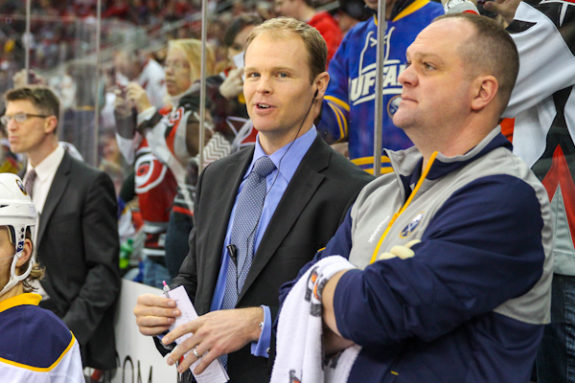
In the meantime, though, the Sad Seven are not just left twiddling their thumbs. They are permitted to trade with one another until the end of this season. With that in mind, let’s surmise some trade scenarios for the Sabres that will not only help the team, but also keep them relevant and semi-interesting.
Let’s look at one trade the Sabres can make with each of the other Sad Seven: the Ottawa Senators, Los Angeles Kings, Detroit Red Wings, Anaheim Ducks, New Jersey Devils and San Jose Sharks. These trades will be a simulation of an actual offseason, so no, you can’t trade Rasmus Ristolainen six times. Without further adieu, here are some trade ideas the Sabres can look at to shake things up.
Ottawa Senators
For this trade, both teams were able to fill holes that needed filling. The Sabres would send the rights to Brandon Montour and Marcus Davidsson to the Senators for Rudolfs Balcers, a 2020 second-round pick (Ottawa) and a 2020 fifth-round pick (Tampa Bay Lightning).
For the Sabres, this helps them in a couple of different ways. They have a logjam on the right side of their defence that would be lessened by the departure of Montour. They would be adding a prospect coming into his prime who could play the wing on the second line potentially while also adding a high second-round pick in a deep draft, helping to fill the pipeline. At worst, Balcers (36 points in 33 AHL games) would be a major improvement to the Rochester Americans.
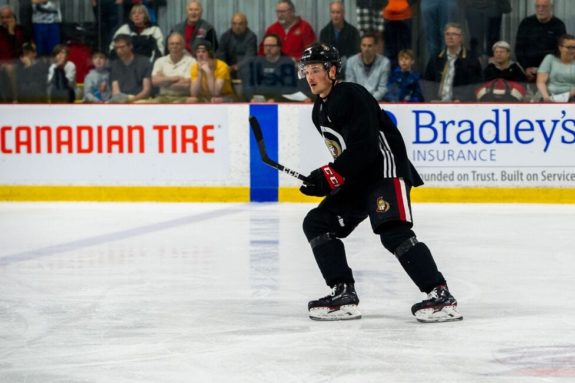
For the Senators, they get a defenceman that can play in the top-four on the right side. They currently only have Nikita Zaitsev signed for next season on that side, so adding Montour would make the transition for Erik Brannstrom a little bit smoother. They can also add a depth piece in Davidsson who can join his brother in the organization. He may not be much more than AHL depth at this point but could blossom into a nice bottom-six contributor if given some time. Balcers may also see himself falling behind Drake Batherson, Josh Norris, Alex Formenton and others on the depth chart. He would seem like an expendable piece for the team to move for help on the blue line.
Los Angeles Kings
The Kings have a plethora of premium young pieces in the organization and may be a challenge for the Sabres to deal with. However, there is one player they may be willing to part with that could provide some value. The Sabres will send Rasmus Asplund to the Kings for Matt Roy.
Related: 1967 NHL Expansion
Who? That’s a fair question. The 2015 seventh-round pick is a 25-year-old, right-shot defenceman that has one more season on his entry-level contract remaining. He will never light up the scoresheet but his even-strength play has been solid.
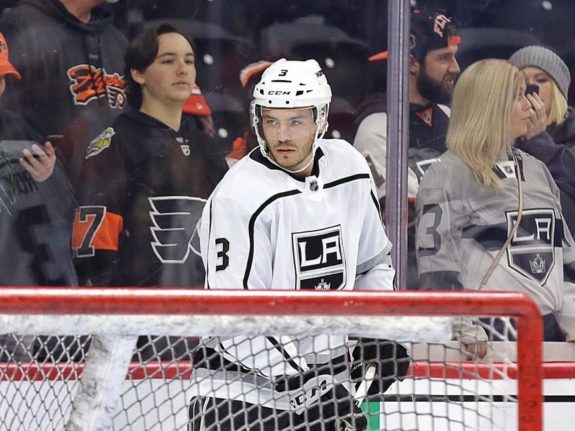
Among players drafted in 2015, he finished second last season in controlling quality chances (xGF%) with a 56.13 xGF%. He finished only behind Anthony Cirelli and ahead of the likes of Jack Eichel, Connor McDavid, Mat Barzal and Mitch Marner. He played over 1,000 tough minutes on a poor Kings team. His even-strength contributions would help the Sabres win more than they lose on a nightly basis.
For the Kings, adding Asplund gives them a depth forward who has shown great strength defensively. Although they have many high-end offensive prospects, Asplund could fit in nicely in a depth role and play responsibly. They could also look to promote Tobias Bjornfot, Kale Clague or Sean Durzi to a spot with the big club or perhaps use their first-round pick to either draft or acquire a defender. They would also draw into a tie with the Sabres in the Rasmus Power Rankings, adding Asplund to Rasmus Kupari.
Detroit Red Wings
Another divisional opponent, the Red Wings and Sabres can find a way to help each other out. The Sabres will send Carter Hutton ($1 million retained) and Casey Fitzgerald to the Red Wings for Jonathan Bernier.
The Sabres would be able to find a presumably adequate running mate for Linus Ullmark next season. Although not putting up massive stats (2.95 goals-against average and .907 save percentage), Bernier made the best of what he had on one of the worst teams of the salary cap era. Based on the quality of shots they faced, he was expected to allow 128.58 goals and allowed 129. Hutton was expected to allow 79.68 goals and allowed 93. If Bernier can bring a similar game to the Sabres, his one season at $3 million would be worth it.
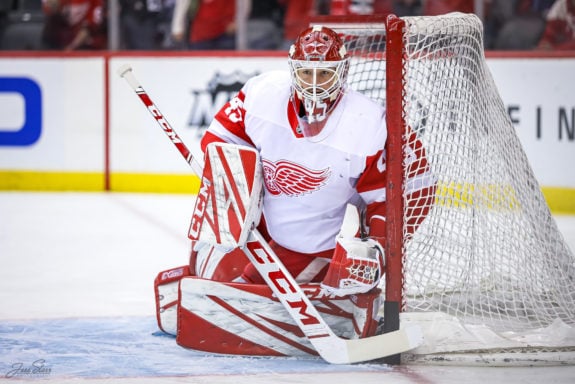
The Red Wings would find themselves with a little more breathing room on the cap. They currently have just over $1.5 million in space but have 12 restricted free agents to deal with in the organization, including eight on the NHL roster. This move would save them another $1.25 million on the NHL roster while also adding a young defensive prospect in Fitzgerald who will be ready to contribute as early as next season. Hutton has great experience with rebuilding teams and would no doubt be a welcomed addition to their locker room.
Anaheim Ducks
This trade sees teams trading young players with the Sabres hoping they can acquire something before it’s too late. The Sabres trade Casey Mittelstadt to the Ducks for Troy Terry.
Related: Two of the Cheapest NHL Trades Ever
Terry is a well-known commodity, being the hero for Team USA in the shootout at the 2017 World Junior Championship. But as our own Anthony Ciardelli speculates, his time with the Ducks may be coming to an end. A change of scenery could do the young, skilled winger a world of good after struggling with the Ducks but putting up 57 points in 55 games with the San Diego Gulls the last two seasons. The Sabres have openings in their top-nine and the addition of Terry could be solid, especially if the team plays beyond overtime.
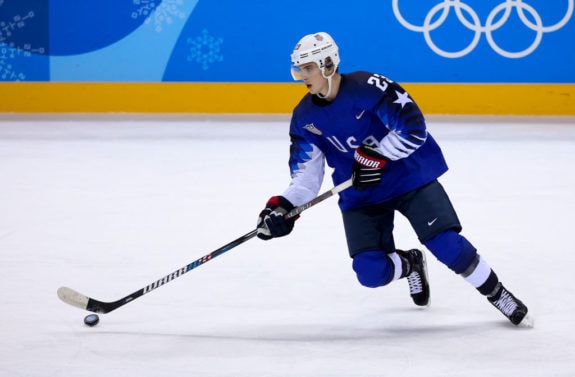
For the Ducks, they will be trading a fifth-round pick for an eighth-overall pick which will always get the fans’ attention. While Terry struggled through injuries and going up and down between the NHL and AHL, Mittelstadt was rushed into too much responsibility too soon with the Sabres, which has hampered his growth. If he could get a fresh start and grow behind the experienced centres the Ducks possess, he could find his footing and begin carving out his NHL career.
New Jersey Devils
Finally. A trade three or more seasons in the making. The Sabres are sending away one of their biggest trade pieces for help up front. They are sending Rasmus Ristolainen to the Devils for Jesper Bratt.
The Sabres send arguably their biggest trade chip for a return that some may feel is underwhelming. What Bratt lacks in name-value he makes up for in on-ice value. He played on a defensive Devils squad and spent a good amount of time on the third line. He has paced at 39, 53 and 44 points in each of his three NHL seasons. Although the Sabres would concede their place in the Rasmus Power Rankings, Bratt’s offensive contributions in the middle-six could go a long way to helping the Sabres emerge from the bottom of the NHL’s scoring basement.
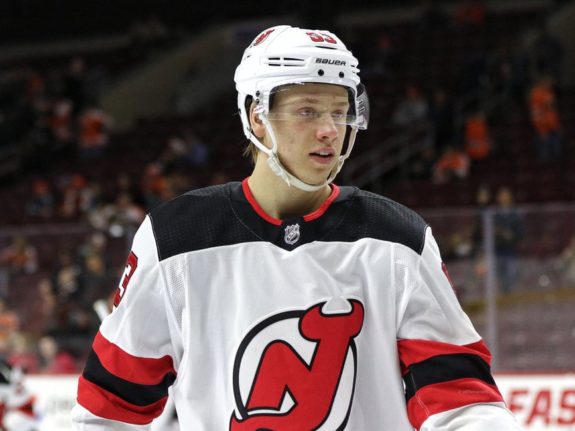
Ristolainen has seen his trade value dip over the past couple of seasons. He still has an offensive flair and plays with an edge that many in the league covet. His defending has been the cause of consternation for Sabres fans. New head coach Lindy Ruff would no doubt love to have a piece of Ristolainen to run his power play and add the snarl that he so desires. The right-side combo of P.K. Subban and Ristolainen is something Ruff would certainly be interested in.
San Jose Sharks
We’ve finally come to the last trade the Sabres can make. This one is a little more risky but may pay dividends in the future. The Sabres send Mattias Samuelsson to the Sharks for Jonathan Dahlen.
Dahlen was drafted in the second round in 2016 by the Senators but has also been a part of the Vancouver Canucks organization. He has played 59 games in the AHL but has 196 games in Allsvenskan, the top Swedish league. In those 196 games, he’s put up 194 points, including over a point and a half per game this season, good for second in league scoring. Why would he be available? He has yet to show a commitment to playing in North America. If the Sabres can move Samuelsson for a shot at an offensive dynamo in the next couple of seasons, they have to do it — at least so they can hear Rob Ray try and remember the difference between Dahlen and Dahlin.
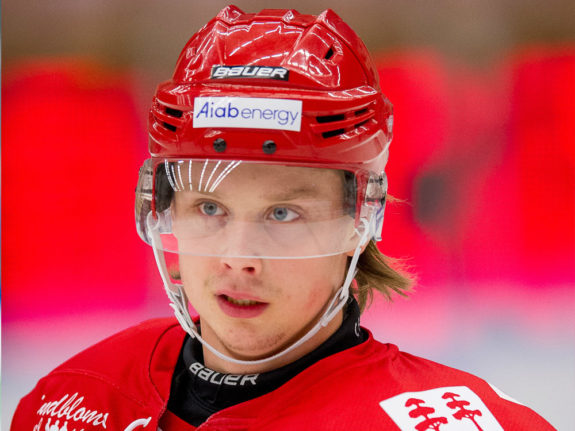
This may seem like an odd move for the Sharks to make. Given the uncertainty of where Dahlen will play, though, the Sharks may be interested in more of a sure thing. Samuelsson is a big body that plays a more defensive game. He has shown leadership, captaining Team USA at the World Junior Championship. Perhaps the resume of being a recent second-round pick and his leadership could be enough for the Sharks to justify parting ways with a risk.
Small Trades For Big Wins
In the end, none of these trades were major blockbusters. Still, the value the Sabres could add through the deals would be tremendous. Looking into the impact on expected goals these moves would have from Evolving Hockey, the team could really start to turn things around.
Expected goals are basically a tool to measure just how likely a particular shot is to go in the net. While shots and shot attempts can be somewhat helpful, expected goals helps us see who really is creating quality chances. Evolving Hockey will measure a player’s impact in this measurement compared to a replacement or AHL player to give a common baseline. This is expected goals above replacement (xGAR). Goalies also have goals saved above expected (GSAx) that determines who is really saving more goals rather than just shots.
Combining these stats together helps us to see the kind of impact these moves would make from an expected law of averages. The players the Sabres would be shipping out had a combined minus-19.8 xGAR. Based on the difference between the quality of chances they created and gave up, they were expected to allow about 20 more goals against them than they would create. By contrast, the players they would be bringing in combined for 20.46 xGAR. These minor moves could bring the Sabres a 40-goal exchange on the positive side!

There are, of course, a number of hypotheticals with these moves. Maybe every other team doesn’t see things exactly the way I do — imagine! Also, while they are a great indicator of success, expected goals stay expected until they actually go in. Even still, these seemingly insignificant moves could help the Sabres turn things around.
These moves addressed the Sabres’ lack of depth in their prospect pool, lack of secondary scoring, goaltending issues and the logjam they have on the right side of their defence. What they didn’t address is the massive need they have for a second-line centre. They still own the eighth-overall pick in the 2020 Entry Draft, which should absolutely be moved if they can find a fit for that position.
In the end, these next three months need not be endlessly boring for the Sabres’ organization. There are moves that can be made, however small, that can put the wheels in motion to success. Let’s see if Kevyn Adams can turn this offseason from the one that never ends to the one we never forget.